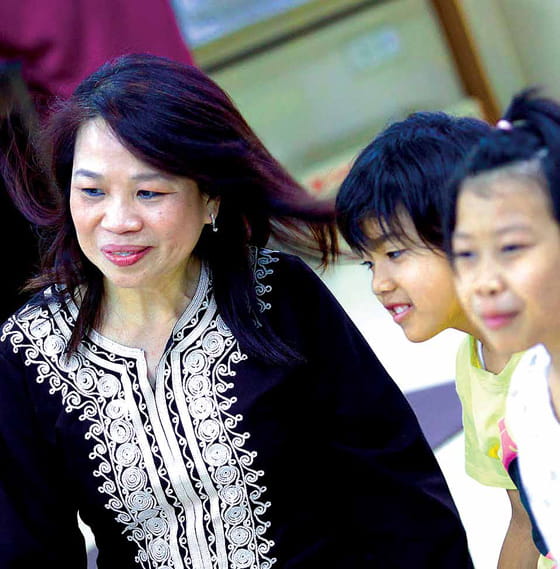Stories > Leading The Charge
Leading The Charge
Those leading the charge for social responsibility through their corporations, international and local, reveal a passion that is rooted in their conscience and displayed through their actions.
By Edwin Loh
Don’t Get Emotional
Annie Yeo, Director, Head of Corporate Responsibility — in Asia, Deutsche Bank
When Deutsche Bank Asia Foundation started in 2003, the bank felt there was a pressing need to address the pervasive HIV-Aids issue in Asia because of the social stigma attached to it, and the fact that it was a cause that was not well supported. Partnering with local non-profit organisations in India, Vietnam, Thailand and Cambodia, it embarked on long-term programmes to put affected children through school as well as provide caregivers with income-generating opportunities.
“At Deutsche Bank, we regard corporate responsibility as an important investment not only in society but in ourselves,” says Annie Yeo, its Director of Corporate Responsibility in Asia. “When communities around us do well, only then will our business succeed. Although our corporate citizenship structure in Asia was only formalised about 10 years ago, today we are involved in 150programmes and more than 37% of our staff participate in volunteering activities in Asia.
“My first on-the-ground experience was heartbreaking.
In 2008, I visited Madam Dao, one of our beneficiaries in Vietnam. She was the sole bread winner of a family of five — one daughter and three grand-daughters. A frail-looking Madam Dao, then in her 70s, eked out a living helping out in the morning market and selling recyclable products at night in Ho Chi Minh City. She made around USD1–2 a day to meet monthly expenses that included USD60 for rental.
“Madam Dao’s daughter looked like a beauty queen but unfortunately contracted HIV Aids through drug abuse. A single mother, her three girls aged nine to 12 were part of our scholarship programme. All five live in a squalid, windowless room, barely 30sqm, devoid of furniture except for some kitchen utensils and clothes.
“To make ends meet, Madam Dao’s daughter sells her ‘services’ to men, who are oblivious to the fact that she is HIV-positive. Their greatest fear was if Madam Dao and her daughter couldn’t bring home the bread, circumstances would force the younger girls to quit school.
“That visit troubled me. Feeling guilty about staying in a luxurious hotel, I took public transport the next day but got robbed! This experience taught me not to get too emotional but to stay focused on how best to help the less fortunate. Today with the help of our local partner, Madam Dao earns a stable income working at a vegetable stall and her daughter is undergoing rehabilitation and working at the rehabilitation center.”
Deutsche Bank Singapore is a co-sponsor of Singapore International Foundation’s Water for Life programme in Siem Reap, Cambodia.
Oldies But Goodies
Jaya Singh, Manager, Human Resources, Thai Express
“We hire mature workers, people with special needs and ex-convicts,”
says Jaya Singh, Human Resources Manager at Thai Express.
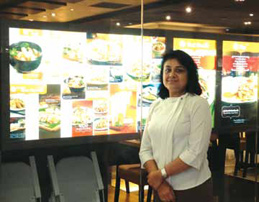 “Mature workers have talent and can contribute to the company. What these people generally look for are a good working environment and short working hours so they can have more family time. They need a job to stay occupied in a good way. With shorter working hours tailored to their needs, they can fulfil their job responsibilities and family obligations. After four hours, they go home to care for their family.
“Mature workers have talent and can contribute to the company. What these people generally look for are a good working environment and short working hours so they can have more family time. They need a job to stay occupied in a good way. With shorter working hours tailored to their needs, they can fulfil their job responsibilities and family obligations. After four hours, they go home to care for their family.
“These people also look for community at the workplace. They usually want to work together with their friends. For example, when we transferred one employee to another outlet, her co-worker requested to join her.”
Most of them are deployed in Thai Express and Xing Wang Café. At any point in time, we try to maintain these mature workers at 20% of our workforce. For sustainable development to happen, we need to focus on what is good for the company as well as the employees. It’s nothing new. If you have a good environment, your staff will be willing to stay with you longer.”
Fitness for Good
Ramlee bin Buang, Executive Vice President And Group Chief Financial Officer, Cerebos
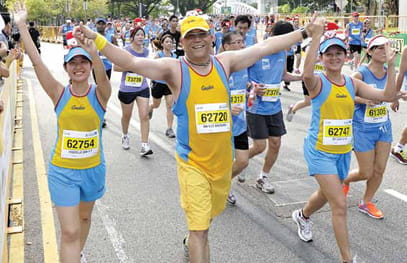 “At Cerebos, we don’t think economics and altruism are opposing forces. In fact, they must be part of the business,” says Ramlee bin Buang, Cerebos’ Executive Vice President and Group Chief Financial Officer. He believes a good corporate social responsibility (CSR) policy that enhances the company’s reputation builds the brand and helps to improve shareholder value and operate a sustainable business in the long run.
“At Cerebos, we don’t think economics and altruism are opposing forces. In fact, they must be part of the business,” says Ramlee bin Buang, Cerebos’ Executive Vice President and Group Chief Financial Officer. He believes a good corporate social responsibility (CSR) policy that enhances the company’s reputation builds the brand and helps to improve shareholder value and operate a sustainable business in the long run.
“We adopt the triple bottom line approach, operating from three aspects: social, economic and environmental. Our corporate policy is to promote education, talent and healthy lifestyles through sport, and to help the less fortunate.
“One of the challenges we face is the misconception that CSR is either about donations or the environment. Staff engagement is key. We motivate them to chip in. Every day at 4.30pm, staff can sign up for a sports activity — there’s golf on Tuesday or running on Wednesday, badminton on Thursday and so on. So, we told them if they join in, they’ll get physically fit. Then management will donate $5 each time our staff takes part in a sports activity, towards The Straits Times School Pocket Money Fund (STSPMF).”
“We feel that the cause resonates with our objective of feeding hungry school children so that they are able to concentrate better in class. These are kids who don’t have enough money for food during recess. Since 2000, Cerebos has raised more than S$1.7 million, and will continue contributing towards it.”
When the earthquake hit Japan in March 2011, the company made a corporate donation of S$100,000 to the Singapore Red Cross Society; employees also chipped in S$16,000 which was matched dollar-for-dollar by Cerebos, and this went towards Japan Red Cross Society in aid of disaster relief.
“Ultimately, you cannot force people to do charity work. It has to come from the heart,” concludes Ramlee.
Green Living
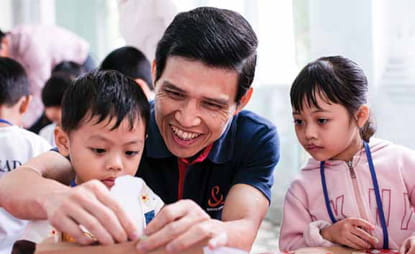 Kwok Yan Hoe, Deputy General Manager, Sustainable Design, Keppel Land International
Kwok Yan Hoe, Deputy General Manager, Sustainable Design, Keppel Land International
Green features are incorporated into Keppel Land’s buildings, from the initial stages of design to construction of its properties.
“Buildings account for about 30% of total energy usage in Singapore. As developers, we need to be socially responsible and do our part to ensure that we ‘green’ our properties, says Kwok Yan Hoe, Keppel Land’s Deputy General Manager, Sustainable Design. I personally feel very strongly about green design and sustainability. I took on this portfolio in 2008 because I really felt that this was something that needed to be done and be made into a way of life.
“Green design in infrastructure, by itself, is not good enough. I may be putting in efficient lighting and airconditioning, but if it’s turned on 24 hours a day, everyday, these features become ineffective. Ultimately, it all comes down to our lifestyles and practices.”
“At home, we make it a habit to recycle waste. I am lucky that my parents inculcated in me the habit of minimising waste. My daughters turn on the air-conditioning only if I give them permission, and it’s just for an hour. Young children may not understand the rationale behind this, but the older ones should. However, educating adults is harder as they have already formed habits.”
Keppel Land is the sponsor of Singapore International Foundation’s Words on Wheels programme in Hanoi, Vietnam and a co-sponsor of the Water for Life programme recently launched in Yangon, Myanmar.
Common Sense and Reality
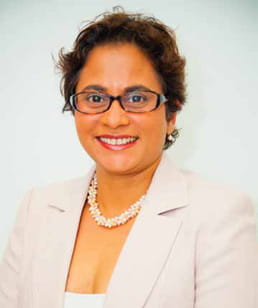 Deanna Ong, Director, Business Development, Origin Exterminators
Deanna Ong, Director, Business Development, Origin Exterminators
The pest control business has a big impact on the environment. For the past 20 years, Origin Exterminators has been placing increasing attention on responsible practices, investing in technology to produce ‘green’ products that are kinder on the environment and safer to use. For example, Origin’s mosquito extermination products took almost a year from developing and promoting the technology to securing its first mosquito treatment contract. Today, this sector is worth almost 50% of its annual turnover of $3 million.
Green products in themselves, however, will not change consumers’ buying habits.
The real challenge lies in influencing consumer perspectives and through that, their choices.
Says Deanne Ong, Director of Business Development. “Pest control work must be sustainable, and educating people is an important part of the process.”
“Going green must stand the test of time. CSR for us stands for Common Sense with a dose of Realism.” For this reason, Origin has built environmental sustainability into the bedrock of its operations. It involves ongoing training for employees; collaborations with schools, NGOs and commercial organisations and engaging industry partners, stakeholders and the general public through campaigns, community projects, international seminars and conferences on Origin’s green-certified (ISO 14001) approach to pest control.
An example of Origin’s CSR at work is its community project in Kreta Ayer last year to educate heartlanders on how to identify bedbugs and prevent future infestations. “It was a one-off project,” says Deanne, “but I hope to pull in other SME partners to make it an ongoing project.”
This event, however, brought an unexpected payoff for Deanne. “I brought my kids down so they could see how I’m spending half of my life.”
“My daughter, who is now nine, said to me: ‘When I grow up, I want to be a pest controller.”
“I was taken aback. I asked her: What do you think a pest controller does?’
“‘They do good.”
“For me, that validated what I was trying to do.”
The Singapore International Foundation has, to date, worked with more than 100 partners, among them corporations, government agencies and civic groups. Many of these partnerships are corporate CSR initiatives.

